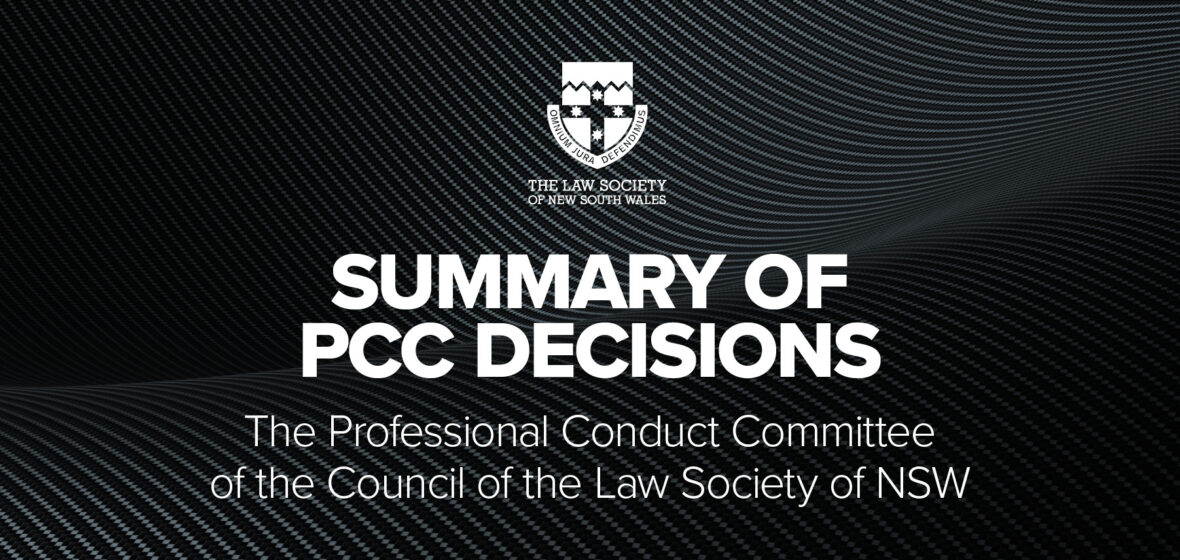The Professional Conduct Committee (PCC) of the Council of the Law Society of NSW (Council), under delegation from the NSW Legal Services Commissioner and the Council, deals with complaints referred to the Council by the NSW Legal Services Commissioner. A total of 149 matters were finalised during the July – September 2022 Quarter.
In relation to two complaints dealt with by PCC in the July – September 2022 Quarter, the Committee decided to refer the complaints to the NSW Civil and Administrative Tribunal (NCAT) because they may involve professional misconduct, or unsatisfactory professional conduct more appropriately determined by the NCAT.
The PCC also determined that four solicitors had engaged in unsatisfactory professional conduct.
In respect of the four solicitors:
- Three solicitors were reprimanded while one was cautioned.
- Of the three reprimanded, two were also ordered to undertake legal ethics training with the Law Society’s Professional Support Unit.
Breach of the Harman principle
One of the complaints considered by PCC involved the use of documents obtained in proceedings before one court in another set of proceedings before a different court, in breach of the “Harman Principle” as outlined in Harman v Secretary of State for the Home Department [1983] 1 AC 280.
The Harman principle essentially provides that, even in the absence of a court order, documents obtained as a result of compulsory processes of the court can only be used for the purposes for which they were disclosed and that they cannot be used for a collateral or ulterior purpose: Harman v Secretary of State for Home Department [1983] 1 AC 280.
The Harman principle was considered upheld by the High Court of Australia in Hearne v Street (2008) 235 CLR 125 (Hearne), which found at [96] that:
“Where one party to litigation is compelled, either by reason of a rule of court, or by reason of a specific order of the court, or otherwise, to disclose documents or information, the party obtaining the disclosure cannot, without the leave of the court, use it for any purpose other than that for which it was given unless it is received into evidence. The types of material disclosed to which this principle applies include documents inspected after discovery, answers to interrogatories, documents produced on subpoena, documents produced for the purposes of taxation of costs, documents produced pursuant to a direction from an arbitrator, documents seized pursuant to an Anton Piller order, witness statements served pursuant to a judicial direction and affidavits.”
Solicitors should be aware that, as well as potentially constituting a contempt of court, a failure to observe the principle in Harman may have disciplinary consequences.
Failure to pay third parties
Two complaints considered by PCC involved failures to pay third parties, specifically, failures to pay a barrister.
Rule 35 of the Legal Profession Uniform Law Australian Solicitors’ Conduct Rules 2015 (Conduct Rules) provides that if a solicitor instructs a third party on behalf of a client, and the solicitor is not intending to accept personal liability for payment of the third party’s fees, the solicitor must advise the third party in advance.
A “wilful or persistent refusal to pay Counsel’s fees [or third parties] can amount to professional misconduct on the part of a solicitor” (Re Robb (1996) 134 FLR 294 at 310. In the circumstances of Law Society of NSW v Davidson [2007] NSWADT 264, delays of between one and four months in paying third parties, including counsel, was held to amount to misconduct on the part of the respondent solicitor.
PCC generally takes the position that disputes relating to debt recovery, in the absence of significant aggravating factors, are more appropriately legal issues for a court or tribunal rather than the disciplinary process.
However, a persistent failure to pay the fees of counsel or other third parties (e.g. expert witnesses) over a delayed period may be found to be either unsatisfactory professional conduct or professional misconduct particularly where the conduct is compounded by a failure to respond to the third party or where an undertaking has been made to pay the fees or where the client has paid money to the solicitor for the fees.
Solicitors should be mindful of rule 35 of the Conduct Rules and the terms of the costs agreement they enter into with counsel and other third parties when they engage them on behalf of clients, including whether they have agreed or undertaken to hold money on trust on behalf of counsel.
Discourtesy
Another complaint considered by PCC involved discourtesy by a solicitor in the context of a dispute where the Solicitor was representing a family member.
PCC has noted there have been a significant number of complaints in this subject matter in recent times and the Chair of the Ethics Committee has prepared a separate article on discourtesy.
Solicitors have an overarching professional obligation and fundamental ethical duty to ensure that their communications are honest and courteous and do not involve offensive or provocative language or conduct. This obligation is expressly recognised in the legal profession legislation. Rule 4.1.2 of the Conduct Rules provides that a solicitor must “be honest and courteous in all dealings in the course of legal practice”. Rule 5 of the Conduct Rules also states that “a solicitor must not engage in conduct, in the course of legal practice or otherwise, which—
“5.1.1 demonstrates that the solicitor is not a fit and proper person to practise law, or
5.1.2 is likely to a material degree to—
(i) be prejudicial to, or diminish the public confidence in, the administration of justice, or
(ii) bring the profession into disrepute.”
The importance of a solicitor maintaining professional courtesy in all dealings in the course of legal practice has been reiterated and reinforced time and again, by the Courts, regulators and legal commentators in both Australia and abroad. The Courts have made it clear that a solicitor who engages in gratuitously rude and discourteous communications or makes insulting and offensive comments which are “extraneous” to the legitimate pursuit of a client’s matter can sound in disciplinary consequences, including findings of professional misconduct or unsatisfactory professional conduct.
And, on the topic of “Importance of maintaining courtesy even if relationships involved are acrimonious”, Riley’s New South Wales Solicitors’ Manual, at 28,010.10, states:
“Professional courtesy is not always easy to display. An opponent’s behaviour may be discourteous, aggravating or insulting, but professionally this provides no licence for returning the discourtesy, aggravation or insult. A lawyer may also be challenged to maintain courtesy in distancing any acrimony that may exist between the litigants from his or her professional relations with the opposing lawyer. To this end, it is important, particularly where opposing clients harbour bitterness toward one another, that “their respective legal advisers retain a degree of objective detachment from that bitterness”. Some clients may perceive that a lawyer who addresses the opposing lawyer courteously and civilly does not share their personal acrimony to the opponent and so may not be fully pursuing their interests. Lawyers should take special care with clients who exhibit attitudes of this kind to explain that discourtesy, in addition to being unprofessional, will likely harm rather than advance the clients’ cause”.
The converse situation — where there exists or arises a personal dispute or antipathy between opposing lawyers — should be addressed with great care to ensure that lawyer animosity does not, as far as is possible, affect their relations in their professional work.
Decisions of the Professional Conduct Committee published on the Disciplinary Register:




